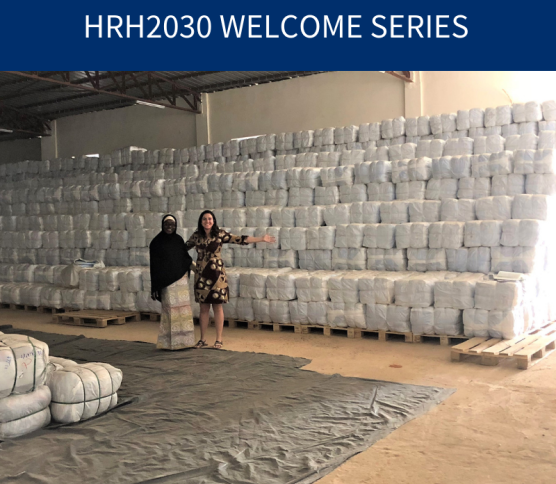
25 Sep Three Questions with Elizabeth McGehee: Ready to Take the Sting Out of Malaria’s Bite

Elizabeth (Liz) McGehee joins HRH2030 as the new project management unit director for the Capacity Building for Malaria (CBM) activity. Liz is a public health specialist with seven years of experience working on USAID-funded programs with Chemonics. Liz received her master’s degree in public health from Tulane University.
1. We would love to learn more about you! What inspired you to work in health?
Growing up in Louisiana and going to school in New Orleans for undergraduate and graduate school, I was very attuned to the fact that my home region had some of the worst indicators for health – for obesity, unintended pregnancy, in HIV and sexually transmitted infections – you name it. Not to mention, I was living in a basin for mosquitos! I was thus fascinated to learn more about how the U.S. had eradicated malaria, despite having so many mosquitos, and what more of the world was doing to combat the disease. So, you could say that my interest in health sprung from the bayou and broadened to capture more globally-focused issues.
2. In your opinion, what are some of the most significant challenges health workers focused on malaria control may face in HRH2030’s CBM countries?
What is particularly challenging about malaria prevention and treatment is the expansive reach required of your activities to make a significant impact. For example, 80 percent of homes must be sprayed with insecticide in order to be protected through indoor residual spraying (IRS). Considering that half of the world’s population live in malaria-endemic areas, this has huge implications on the number of bed nets required to purchase and distribute in malaria programming!
To overcome the breadth of this challenge, it is important for health worker – especially health worker leadership within National Malaria Control Programs (NCMPs) – to be reassured that there are already reliable, effective, evidence-based core interventions available to move the needle on this disease burden.
These core interventions include vector control (IRS and bed net distribution), preventive therapies (intermittent preventive treatment and seasonal malaria chemoprevention), diagnostic testing, and effective treatment (with accompanying procurement and supply chain management activities).
CBM’s embedded advisors, in eight highly-endemic malaria countries, make themselves available to guide health workforce leadership, and strengthen National Malaria Control Program (NMCP) institutional capacity, to oversee the careful coordination of all of these malaria control activities at all levels of the health system. By helping to organize these core interventions into three to five strategies, one-year implementation plans, and tangible, clear next steps for the immediate future, health workers can begin to see the end, and a path to elimination, for what had previously seemed like a more significant disease to overcome.
3. Working with HRH2030’s CBM activity, what do you hope to improve?
One of CBM’s key initiatives is to further develop and support a community of practice among the network of embedded advisors and NMCP representatives across the globe – expanding beyond our eight target countries. Personally, I am hoping that through this carefully shepherded community of practice, we can best connect NMCPs around the world so that they can continue to support each other beyond the life of the project.
HRH2030’s Capacity Building for Malaria activity supports selected long-term technical advisors for National Malaria Control Programs by providing a framework to help advisors identify obstacles that prevent countries from achieving their malaria control goals.
Photo: Liz McGehee and representative Zaratou Ankourao, pharmaceutical policy arm of the Ministry of Health, pose in front of Global Fund-purchased long-lasting insecticide-treated nets in Niamey, Niger in March 2018. As Niger became a focus-country of the President’s Malaria Initiative, the two worked with Global Fund implementing partners to determine co-warehousing possibilities for anticipated shipments of USAID-funded bed nets.





